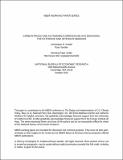Carbon Prices and Automobile Greenhouse Gas Emissions: The Extensive and Intensive Margins
Author(s)
Knittel, Christopher Roland; Sandler, Ryan
DownloadKnittel_Carbon prices.pdf (283.1Kb)
OPEN_ACCESS_POLICY
Open Access Policy
Creative Commons Attribution-Noncommercial-Share Alike
Terms of use
Metadata
Show full item recordAbstract
The transportation sector accounts for nearly one third of the United States' greenhouse gas emissions. While over the past number of decades, policy makers have avoided directly pricing the externalities from vehicles, both in terms of global and more local pollutants and Corporate Average Fuel Standards have changed little since the mid-1980s, there is now considerable interest in reducing greenhouse gas emissions form the transportation sector. Many have argued that the unique features of the sector imply that pricing mechanisms would have little affect on emissions. This paper analyzes how pricing carbon through either a cap and trade system or carbon tax might affect greenhouse gas emissions from the transportation sector by estimating how changes in gasoline prices alter consumer behavior. We analyze their effect on both the intensive (e.g., vehicle miles travelled) and extensive (e.g., vehicle scrapping) margins. We find large effects on both margins.
Date issued
2010-10Department
Sloan School of ManagementJournal
The Design and Implementation of U.S. Climate Policy
Publisher
University of Chicago Press
Citation
Knittel, Christopher R, and Ryan Sandler. "Carbon Prices and Automobile Greenhouse Gas Emissions: The Extensive and Intensive Margins." In Fullerton, Don, and Catherine Wolfram (Eds.), The Design and Implementation of US Climate Policy. Chicago: University of Chicago Press, 2012, 287-299.
Version: Author's final manuscript
ISBN
9780226921983